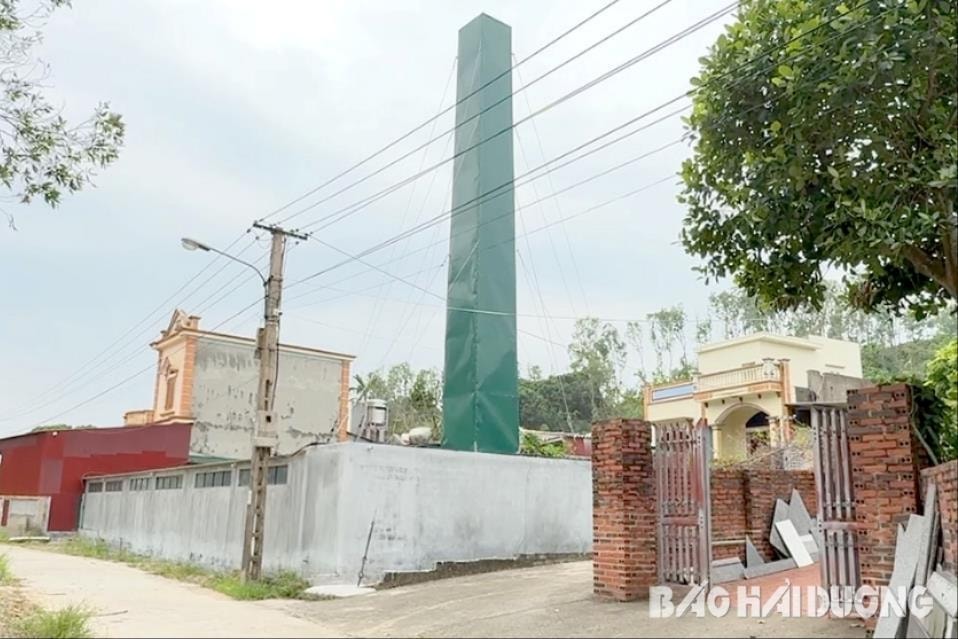Relocating livestock households out of Hai Duong's inner city area is necessary, contributing to resolving public concerns about the situation of 'pig pens next to houses'.

The case of Mr. Vu Van Dong's family in Ninh Chap 5 area, Thai Hoc ward (Chi Linh, Hai Duong) building a pigsty of more than 100 m22There is a 20m high exhaust pipe located right in front of a neighbor's house, causing outrage among the people in this area. The wastewater tank of Mr. Dong's pig pen is also built outdoors, about 20m wide.2located just over 40m from the cultural house of Ninh Chap 5 residential area.
Intercropping livestock in residential areas is not uncommon in districts, towns and cities of Hai Duong province.
In recent times, along with the urbanization process, there are still many residential areas in wards and towns with agricultural land, people still practice livestock farming to take advantage of agricultural by-products, increase production and improve economic life. However, livestock farming interspersed in residential areas can easily lead to air, water and land pollution due to waste from livestock and poultry.
The foul smell from livestock farming also affects the quality of life of the people. Moreover, uncontrolled livestock farming in residential areas can cause infectious diseases, directly affecting public health.
In recent years, livestock production in Hai Duong province has developed quite well, contributing to job creation and increasing income for people. However, the above limitations are also limitations of the agricultural and rural development sector.
The regulation that areas within the inner city of cities, towns, townships, and residential areas are not allowed to raise livestock was first legalized in the 2018 Law on Livestock (effective from January 1, 2020), decentralizing and assigning authority to the People's Councils of provinces and cities to specify.
On November 14, at the 27th Session (special session), the People's Council of Hai Duong province passed a Resolution regulating areas where livestock farming is not allowed in the inner city of cities, towns, townships, residential areas and support policies when relocating livestock facilities out of areas where livestock farming is not allowed in Hai Duong province.
Determining areas where livestock farming is not allowed in the inner city of cities, towns and townships is very necessary and suitable for urban development.
According to the synthesis of the Department of Agriculture and Rural Development, by October 30, 2024, the whole province only had 510 out of nearly 237,000 livestock households in the inner city areas of the city, towns, townships, and residential areas not allowed to raise livestock as proposed in the draft resolution, accounting for 0.21%. Of which, 469 households (accounting for 91.96%) raised livestock on a small scale, household scale; 40 households (accounting for 7.84%) raised livestock on small-scale farms and 1 household (accounting for 0.2%) raised livestock on a medium-scale farm.
On the other hand, the total number of livestock and poultry in the proposed area that is not allowed to be raised is about 48,000, accounting for only 0.27% of the total livestock and poultry herd of the province. Therefore, the resolution will not have much impact on the development of livestock production in the province.
However, the resolution will also affect the lives of households with livestock activities in the affected areas, especially poor and near-poor households whose main source of income is livestock. The good news is that according to the review of districts, towns, cities and the synthesis of the Department of Agriculture and Rural Development, out of 510 livestock households, 1 household wants to move to a new location, the remaining households, when the resolution is issued, will comply with the regulations and stop livestock activities in the proposed area where livestock is not allowed.
Returning to the story of Mr. Dong’s household in Thai Hoc ward mentioned above, on the afternoon of November 13, according to the ward leader, in the previous review by the agricultural sector, this household was not included in the list of households to be relocated. This household has recently started raising pigs.
In the coming time, the review of livestock farms in unauthorized areas needs to be conducted regularly and strictly implemented from the grassroots level.
ORIGINAL